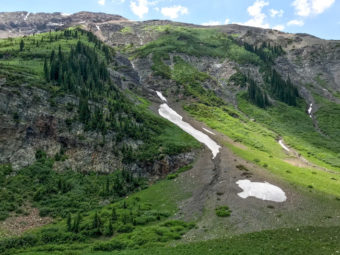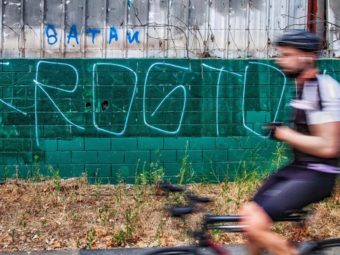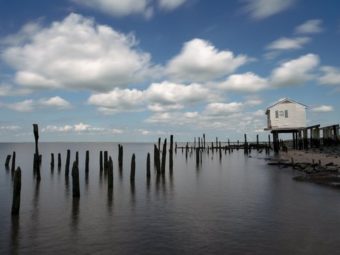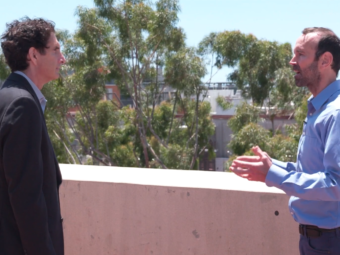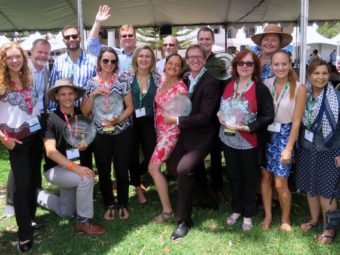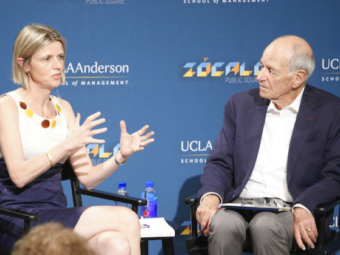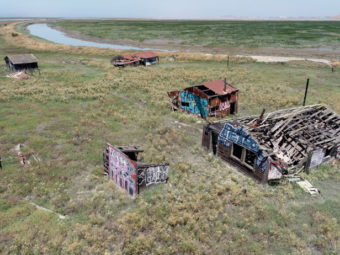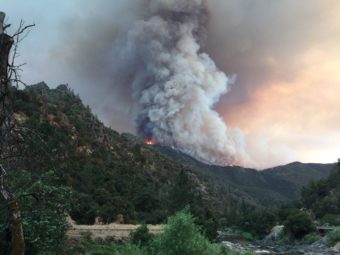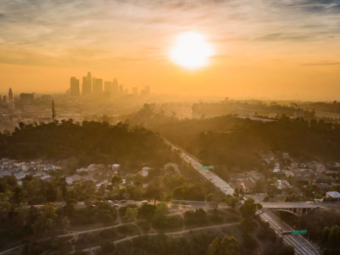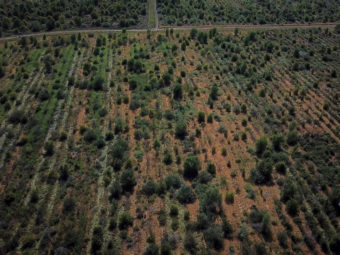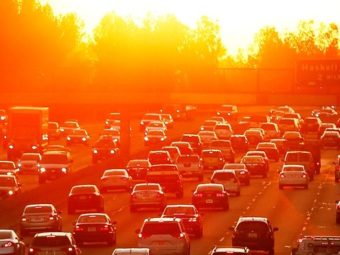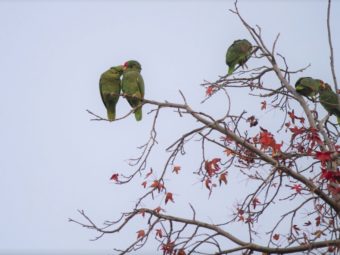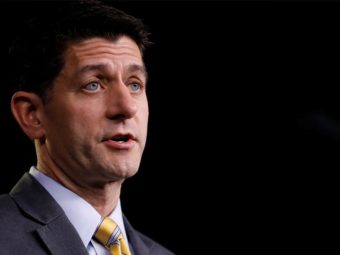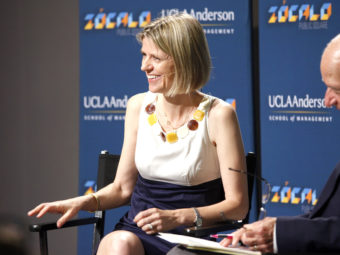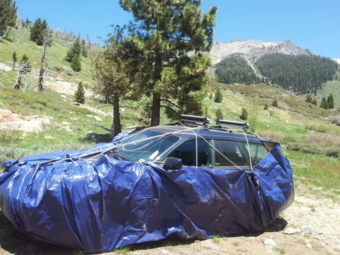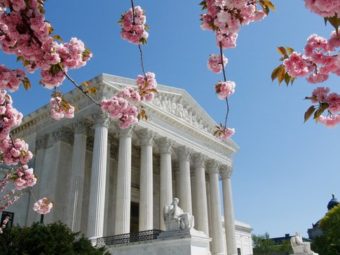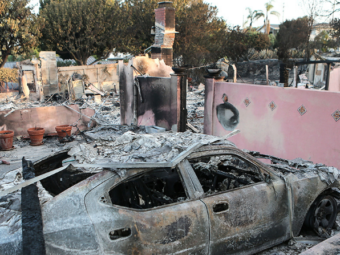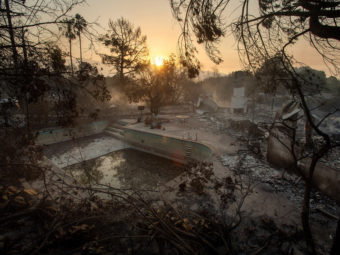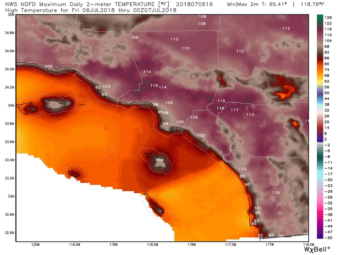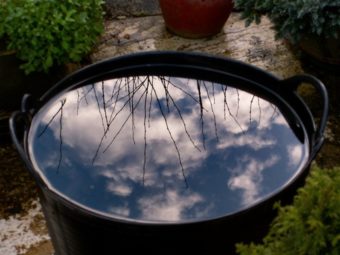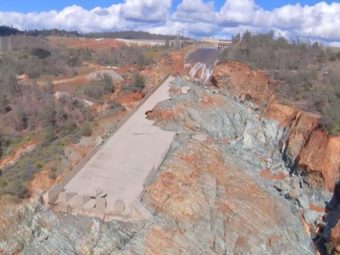IoES in the News
Headline
Spring Is Springing Sooner, Throwing Nature’s Rhythms Out Of Whack
Dan Blumstein joined Nathan Rott on NPR's summer series to speak on how the spring is consistently starting early and explains what characteristic animals need to adapt to earlier spring times.
Headline
Can L.A.’s Frogtown Survive Gentrification?
With the revitalization of the LA River, the nearby city, Frogtown, fears the consequences. "Green gentrification" is the idea that the new green spaces will change the neighborhood by increasing the property value and pushing out the community. “The danger here is that the fear of green gentrification could lead to opposition to parks and open spaces in neighborhoods that are particularly poor. We know that the exposure to nature and the ability to be outdoors is good for people. These are neighborhoods that need more parks, need more access to nature and have historically not had that,” said UCLA professor, Jon Christensen.
Headline
Surrendering to Rising Seas
Jen Schwartz from Scientific American looks into a resident's experience of living in a New Jersey floodplain after Superstorm Sandy. It was the third time that the neighborhood was hit with floodwaters within 3 years and their homes needed constant fixing and updates. UCLA's Liz Koslov wrote, "the complexity and ambivalence of retreat serves as a reminder that there are no easy solutions and that it is not possible to rebuild forever or to wall ourselves off from the problems we face."
Headline
Is Climate Change Causing Wildfires Throughout the U.S.
Fire. It’s a powerful — but natural — part of nature in California and the western United States. UCLA prof Alex Hall joined PBS SoCal’s David Nazar to talk about how climate change is affecting wildfire… creating a new reality we must adapt to. Sustaining California is a new show that takes a deep look at sustainability issues that affect our lives — bringing together experts, business leaders, government officials and people from communities across the state.
Headline
UCLA wins awards at sustainability conference
"UCLA has been awarded four best practice awards in the 14th annual Higher Education Energy Efficiency and Sustainability competition. Among the honors was recognition for the Sustainable LA Grand Challenge, a campus wide research initiative that aims to transition Los Angeles County to using 100 percent local water and 100 percent renewable energy by 2050."
Blog
UCLA Anderson’s Magali Delmas Sheds Light on the New Climate for Corporate Environmental Responsibility
UCLA Anderson takes a look into UCLA's Magali Delmas' career, her interest in encouraging industries to become more environmental, and her motivation behind writing her new book, "The Green Bundle." At a Zocalo Public Square event, she explains what needs to be done to create successful green products and it includes selling personal benefits and providing the information. With those things, consumer behavior can be changed for the better.
Headline
When corporations take credit for green deeds their lobbying may tell another story
Industries are creating green initiatives, however, some programs are not bringing results and these industries are they are fighting environmental regulations behind the scenes – “talking green while lobbying brown.”…
Headline
How Drawbridge is drowning — and what it means for our future
Drawbridge, in the Bay area, used to be a populated island town in the 1880's to early 1990's. Now the buildings are sacred and the remaining structures are battling the elements. UCLA professor, Glen MacDonald, described the city as a “a memorial to past human aspirations and a memorial to failure." It was poorly built right above sea level without thought of sustainability. Nature is now regaining control over the area.
Headline
Yosemite Fire Latest: Blaze doubles in Size, Blankets Park in Smoke
"The Ferguson Fire in Maricopa County spread to 9,266 acres, with hundreds of firefighters assisted from the air battling the blaze that is only 2 percent contained... Daniel Swain, a climate scientist at the University of California at Los Angeles, believes the fire could pose a major threat to the 1,200 square mile park," wrote Tom Porter and Reuter in Newsweek.
Headline
Why You Really Need to Stay Inside for ‘Spare the Air’ Days
When the high temperatures hit, people usually do not think of air pollution. UCLA professor, Yifang Zhu, in Health Line explains how "potent and potentially dangerous levels of air pollution" can become during warm months and the importance of being aware of the "Spare the air" days.
Headline
Kavanaugh in line to decide ‘sleeper case’ that could rein in EPA, other agencies
The Supreme Court agreed to hear the case, Gundy v. United States, and Kavanaugh may be the deciding vote. "'This is a really important sleeper case,' said Sean Hecht, a law professor at University of California, Los Angeles who has been tracking the Gundy proceedings... If the court rules very broadly, the justices could throw into question numerous legal provisions that currently give the EPA and other agencies latitude to set policy."
Headline
California Is Preparing for Extreme Weather. It’s Time to Plant Some Trees.
UCLA's Daniel Swain's research found that there will likely be a "really big increase in wet events" because climate change is causing there to be more moisture in the atmosphere. We need to prepare for these severe events. River Partners is a conservation group restoring farmland in the the Central Valley. Their executive vice president, Julie Rentner, said, “there’s always an opportunity to use vegetation and this green infrastructure to lower flood risk — move the water where it will do the most good and redirect it from places that will do the most harm. And you can do that in a way that is durable and sustainable over time.”
Headline
26 Climate Scientists Urge Gov. Brown to Phase Out California Oil Extraction
“We urge Governor Brown to show science-based climate leadership and protect California communities by addressing California’s own dirty oil extraction,” said UCLA's Dr. Aradhna Tripati. She is one of the twenty-six climate scientists coming together to call Governor Brown to action to divert from oil and gas to meet Paris Agreement goals and help communities harmed by the industry.
Headline
L.A.’s Not Just Sizzling, It’s Sultry: Why California’s July Heat Wave Is So Weird
“This has been an extraordinary heat wave,” said UCLA's climate scientist Daniel Swain in Scientific American. Not only were the high temperatures extraordinary in California for the July heat wave, the time of the year, high temperatures moving into the night, and humidity levels were as well.
Headline
The future of our electric grid, the journey from Guadalajara, the wild parrots of Pasadena
UCLA's Ursula Heise joined A Martinez on KPCC’s Take Two to talk about the thriving population of abut 3,000 Red-Crown parrots in Pasadena, a species that is endangered in Mexico. She explores the possibility of cities as an artificial ecosystem — and how they can be made more hospitable for people and wildlife.
Headline
Paul Ryan Says a Family of Woodchucks Destroyed His Car
Paul Ryan reported that his (R-Wisc.) Chevrolet Suburban was home to a family of woodchucks during the winter. During their stay, they bit through the wires and the car no longer runs. UCLA's professor, Daniel Blumstein, explained why they would in the car and showed them sympathy. “We’ve got marmots climbing in cars and being driven around and sometimes getting killed and eating cars and destroying wiring... But usually they’re going for the radiator fluid, somehow. And it can’t be good for them.”
Headline
Helping the Environment is Nice. Helping Yourself is OK, Too.
Transforming "green into gold": UCLA economist Magali Delmas joined Zocalo Public Square to discuss how companies can better reach consumers with green products. In her new book, "The Green Bundle: Pairing the Market with the Planet,” she points out that most people are convenient consumers — it's not enough for a product to be simply be good for the planet. The key? Bundling the environment with personal benefits.
Headline
Paul Ryan says his car was eaten by woodchucks — we investigate
Paul Ryan says his car was eaten by woodchucks. The Verge and UCLA professor, Daniel Blumstein, explore ways to prevent marmots from inhabiting your car and biting through the wires —…
Headline
Kavanaugh pick threatens EPA policies, FERC authority, lawyers say
"[Kavanaugh] tends to be very stingy and cramped in interpreting agency rulemaking authority," said Cara Horowitz, co-director of the UCLA Environmental Law Clinic in Utility Dive about the new Supreme Court nominee, Judge Brett Kavanaugh.
Headline
Wildfires, Record Highs Scorch California
The heat wave hit California in July, breaking temperature records and leaving areas in a blaze. "The overall trend over decades to more intense and more frequent heat waves is definitely a signal of global warming," said UCLA's climate scientist Daniel Swain.
Headline
Record Heat in Southern California, and an Ominous Start to Wildfire Season
"Heat waves in recent years have become more intense, a consequence of global warming", Daniel Swain, UCLA climate scientist said in the New York Times, "raising the possibility of ever-deadlier fire seasons."
Headline
Executive Summary for July 6th: Wildfires Plague the West
“The extreme heat and localized strong offshore winds along the SoCal coastal plain will clearly lead to major fire weather concerns Friday-Saturday [7/6/18-7/7/18],” UCLA climate scientist, Daniel Swain said. “This will be of particular concern given the high degree of ongoing large fire activity in NorCal and subsequent drawdown of firefighting resources, likely fueled in part by our dry winter and the legacy of long-term drought.”
Headline
All-time high temperature records set throughout Southern California, including Los Angeles
Daniel Swain's blog post featured in Washington Post article: "The clockwise circulation around the heat dome and resulting offshore winds will force air down mountain slopes adjacent to coastal areas, compressing and heating the air. 'This will likely be a high-impact and memorable heat event.'”
Headline
It’s Summer, But LA Is Thinking About How To Catch Rain
"You see a storm year like [2016] and you see all the water that ends up going through the L.A. River and Ballona Creek and Dominguez Channel, and you say, 'Wow. That could have been our water supply for the next year,'" said Mark Gold of the UCLA Institute of the Environment and Sustainability.
Headline
Climate Change Contributed to Oroville Spillway Collapse, Study Says
A study led by UCLA IoES Center for Climate Science postdoc Xingying Huang finds that climate change has already contributed to greater wintertime runoff in the Sierra Nevada, and that flood risk climbs in the future. "Our big dams were designed to capture smaller floods than what we expect in the future," said colleague Daniel Swain in Weather Channel. "...these structures were built for a climate that we no longer have."

